
DHL Express expects supply chain shifts to boost its SE Asia business, reposes faith in Hong Kong’s role as Asian logistics hub
- DHL sees business growth from supply chain shifts to Southeast and South Asia, regions close to China with friendly foreign investment policies, says DHL APAC CEO
- Hong Kong to efficiently serve as a centre of DHL’s Asian logistics network given the city’s connectivity and infrastructure, says CEO Ken Lee
DHL Express expects its business in the Asia-Pacific market to outperform other regions this year, driven by volume recovery in Southeast Asia, which is benefiting from inflow of supply chain businesses moving out of China amid geopolitical tensions.
These trends, which began in 2018 after then-president Donald Trump launched a trade war against China, have gathered pace with even Chinese firms moving supply chains out of the country to manage business risks.
“Asia-Pacific is probably the most promising region because we see quite a recovery in the volumes moving forward,” Ken Lee, CEO at DHL Express Asia-Pacific, said in an interview with the Post.
While worldwide supply chains are fragmenting amid changing trade policies, coronavirus pandemic disruptions and rising geopolitical tensions, these businesses are moving towards Southeast and South Asian countries, which are not only close to China but also have friendly foreign investment policies, Lee said while naming Malaysia, India, Thailand, Vietnam and Indonesia as those witnessing this trend, Lee said.

“Our customers guide us to where we want to invest,” said Lee in whose view proximity to customers was an important strategy.
“Whenever businesses decide to expand their base beyond China to new locations, we come into play,” Lee added.
The company recently added a new flight from Australia to Hong Kong as it sees a “big capacity crunch between Asia and Australia”, Lee said.
“Australia has got a lot of volumes going in. But there isn’t enough capacity out there. Putting this extra plane would increase our load by at least five times from what we have been able to do.”
A new facility in Kuala Lumpur and Adelaide will be ready in the second half of the year, according to the company.
DHL Express recorded €632 million in earnings before interest and taxes in the first quarter this year, a year-on-year drop of 30 per cent, according to a company statement on Tuesday.
Weak demand led to a slight decline in shipment volumes, the statement said, but Lee said the numbers were “within expectations”.
“We are expecting this year to be a year of normalisation, and a year of opportunities for us,” he said. “In short term we do have our own cost management measures. But that will not stop us from continuing to invest.”
DHL Express had said it will invest around €750 million in Asia-Pacific as the region benefits from booming e-commerce. Towards this it spent HK$3.2 billion (US$409.7 million) on expanding its Central Asia hub last November, with Hong Kong as one of its three global hubs.
The Central Asia Hub has seen a total investment of HK$4.9 billion since 2004, making it DHL Express’s largest infrastructure investment in Asia-Pacific.
Last month, DHL Express announced the launch of the HK$1.5 billion West Service Center, located in Tuen Mun.
Hong Kong’s airport is one of the world’s busiest for international cargo and the company is confident the city will efficiently serve as a centre of its Asian logistics network given its connectivity and infrastructure, the Asia-Pacific CEO said.
“Whenever we invest in infrastructures and facilities, we look at the span of five years and beyond,” he added. “As long as China continues to trade with the world, Hong Kong will play a very important role.”


